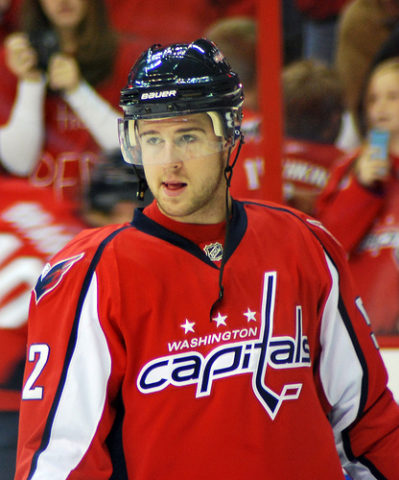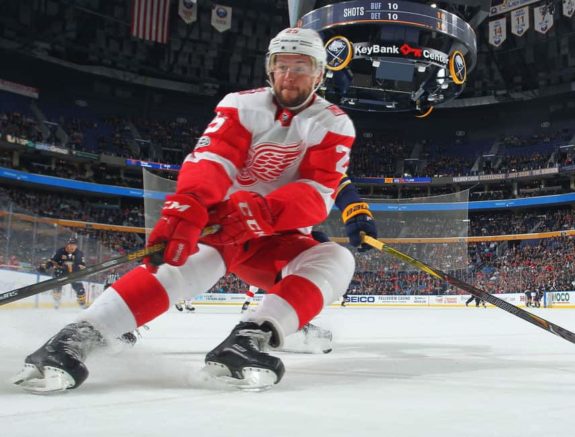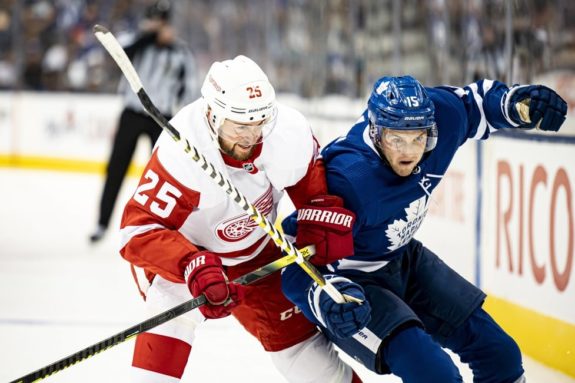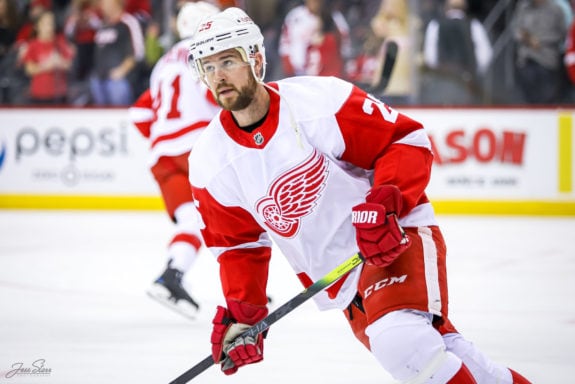It’s official: one of the Washington Capitals’ “Young Guns” has officially retired.
For those unfamiliar, the “Young Guns” was the nickname for Alex Ovechkin, Nick Backstrom, Alex Semin and Mike Green when they were budding superstars for the new era of Capitals hockey during the early 2000s. This was when the Capitals began their “Rock The Red” campaign, which has been the slogan of the Ovechkin era in Washington. These youthful players helped revitalize a team that hadn’t seen a young and exciting group in quite some time.
All of these Young Guns eclipsed 500 points in their NHL careers, which is an impressive stat in its own regard. Something even more impressive is that one of them is a defenseman. Mike Green was the only blueliner of the group, and at age 35, decided to hang up the skates.

Although he ends his career with a 2019-20 regular-season stat line of 50 games played, three goals and eight assists for 11 points, it shouldn’t be forgotten just how dominant Mike Green was in his prime. Green deserves a career retrospective, because what he was able to accomplish from the blue line is both incredible and underappreciated.
The Early Days
The Washington Capitals secured one of their best first rounds in franchise history at the 2004 NHL Entry Draft when they selected defenseman Mike Green 29th overall. They had also taken a young Russian player first overall who has carved out a decent career for himself with the Capitals.
All jokes aside, in that first round the Capitals selected their franchise forward in Alex Ovechkin and a franchise defenseman in Mike Green. Every single NHL team wishes they could have a draft that successful, let alone a single round that successful. The Caps also took Jeff Schultz at 27th overall, but hey, 2-for-3 ain’t bad.
After finishing out his junior career the following season with the Saskatoon Blades, Green joined the Hershey Bears for the 2005-06 season. He adapted to professional hockey pretty well under head coach Bruce Boudreau, as he put up 43 points in 56 games with the Bears. They would also go on to win the Calder Cup, where Green had 18 points in 21 games during the playoffs. That same season, the Alberta native joined the Capitals for 22 games, where he put up just three points. However, one of these was his first NHL goal.

The following season, they promoted Green to essentially a full-time NHLer in 2006-07 where he played in 70 games with the Capitals and 12 with the Bears. He amassed just 12 points in his 70 NHL games and 8 in his 12 AHL games. He also notched 16 points in 19 AHL playoff games.
It was clear that Green was ready for a full-time NHL position and didn’t need any more games in the minors, so in 2007-08, he played in his first full season with the Capitals without seeing anytime spent in Hershey. He made quite the impression.
Mike Green’s Dominance
In 2007-08, Green played all 82 games for the club. In those 82 games, he scored 18 goals and 38 assists for 56 points. He also had seven points in his first seven playoff games, which was the first time the Capitals had been in the postseason since Ovechkin and Green joined the team. Green finished seventh in Norris Trophy voting in his second NHL season.
That second season was great for Green, but it was nothing compared to what would happen in his third full season. This was the season that made Green a household name and established him as one of the best defensemen in the league.
In the 2008-09 season, Green missed some games due to injury and only played 68 during the season. However, in those 68 games, Green scored 31 goals and 42 assists for 73 points. His 31 goals are tied for ninth-most goals by a defenseman in a single season in NHL history. He was also the first defenseman to score 30 goals in a season since Kevin Hatcher, also with the Capitals, back in 1992-93 when he scored 34. This also made him only the eighth defenseman in NHL history to score 30 goals in a season. He would finish second in Norris Trophy voting behind Zdeno Chara of the Boston Bruins.

In that season, Green set two records as a blueliner. One was an NHL record and one was a franchise record. He scored a goal in eight consecutive games, which is the most consecutive games with a goal scored by any defenseman in NHL history. He also scored the most power-play goals by a Capitals’ defenseman in a season with 18 on the man advantage.
Green didn’t slow down the following year, as he scored 19 goals and added 57 assists for 76 points in 75 games in 2009-10. Again, Green would finish second in voting for the Norris Trophy, behind Duncan Keith of the Chicago Blackhawks.
If you ever find yourself asking why people say Mike Green was underappreciated, look no further than these back-to-back seasons. I think it is undeniable that he should have secured at least one Norris Trophy as a result of his play during these two seasons.
In Tarik El-Bashir’s article on Mike Green’s retirement, he brought up an amazing stat that shows just how dominant Green was during these years. El-Bashir writes, “From 2007-10, Green amassed 68 goals and 205 points in 225 games — the most among blueliners, by far. (Detroit’s Nicklas Lidstrom was second in that span with 178 points in 236 games). Green was also tops in game-winners, with 12 during that stretch,” (from “‘I needed to move on’: Mike Green retires, reflects on Capitals, career and future”, The Athletic, August 26, 2020).
Final Years With The Capitals
Mike Green dealt with some serious injury issues which left him available to play only 116 games over the following three seasons for the Capitals. In those 116 games, Green put up 57 points. He also played 29 playoff games during these three seasons and added 14 postseason points. One of those was an iconic playoff overtime goal against the New York Rangers in 2013.
He had a better season in 2013-14 which saw him back in action for the majority of a regular season as he played at least 70 games for the first time since 2009-10. In those 70 games, he only put up 38 points which, based on the standard he set, was extremely low for Green. The Capitals also missed the playoffs for the first time in six seasons that year.
2014-15 was Green’s last season with the Capitals as it was the final year of his three-year, $18.25 million contract, which he signed in 2012. He saw an uptick in performance in his concluding season with the Capitals, but again, not to the extent of 2010 Mike Green. In 72 games, he scored 10 goals and added 35 assists for 45 points — his highest point total since 2009-10. Washington defeated the New York Islanders in seven games in the first round, but lost to the New York Rangers in seven games in the second round. In 14 postseason games played, Green managed only two assists for two points.

Green would sign with the Detroit Red Wings on July 1, 2015, for three years with an average annual value of $6 million.
The Final Years of His Career
Mike Green would battle injuries during his time in Detroit as well, as he only played 305 games for the Red Wings and Edmonton Oilers in the better part of five seasons. In those 305 games, Green scored 37 times and had 104 assists for 141 points. He also played five playoff games and had a goal and an assist for two points.
Mike Green finishes his career with 880 games played in the regular season. In those 880 games, Green scored 150 goals and had 351 assists for 501 points which is an impressive feat from the back-end. He added 76 playoff games played and 37 postseason points.
Although Green declined as he got older, he was still a productive defenseman who averaged roughly 30 points per season. He may not have been able to achieve what he had in years prior, but he dealt with injuries and was also on a rebuilding Detroit team for most of his tenure in the Motor City.
If you are a Capitals fan, you look back on Green fondly because he was one of the Young Guns and an elite talent that performed night in and night out. I also think that if you ask fans about which former Capital they wish was on the Stanley-Cup-winning team in 2018 the most, the majority of them would say Mike Green. He was beloved in D.C. and rightfully so.
In the same Athletic article by El-Bashir, Capitals play-by-play man for NBC Sports Washington, Joe Beninati, said of Green not being on the Cup-winning team, “There’s a lot of guys you think back on, that you wish could have been on the 2018 team. I wish Mike Green could have been there because I associate him with that group of young guys.’
Green holds no resentment, as in that same Athletic article he discussed the Capitals winning the Cup and said he felt “[p]ure joy…Such a long time waiting. Well-deserved. I was thrilled for them, all of them. Nobody more deserving than Ted Leonsis, management and obviously, Ovi, Backy, Braden Holtby, John Carlson, Tom Wilson, all the guys that I played with.”

It is criminal that Green is retiring with no hardware for his efforts. He was one of the most dominant defensemen of the 2000s despite his injury-riddled seasons and decline.
There was never a point when Mike Green was a bad player. There was a time when he was one of the best players in the world. Not everybody acknowledges that, and that is why he is underappreciated.